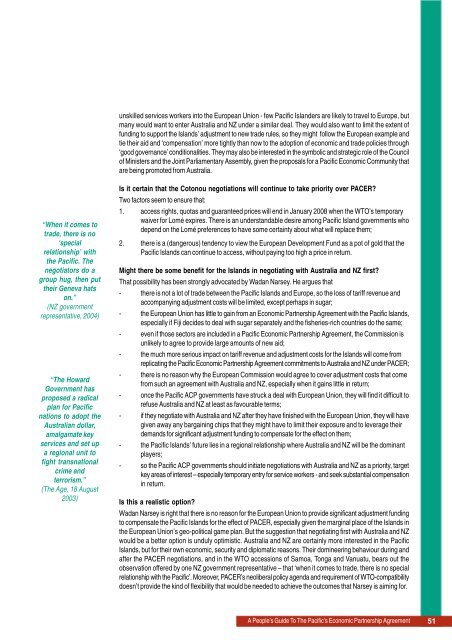REPA Booklet - Stop Epa
REPA Booklet - Stop Epa
REPA Booklet - Stop Epa
Create successful ePaper yourself
Turn your PDF publications into a flip-book with our unique Google optimized e-Paper software.
unskilled services workers into the European Union - few Pacific Islanders are likely to travel to Europe, but<br />
many would want to enter Australia and NZ under a similar deal. They would also want to limit the extent of<br />
funding to support the Islands’ adjustment to new trade rules, so they might follow the European example and<br />
tie their aid and ‘compensation’ more tightly than now to the adoption of economic and trade policies through<br />
‘good governance’ conditionalities. They may also be interested in the symbolic and strategic role of the Council<br />
of Ministers and the Joint Parliamentary Assembly, given the proposals for a Pacific Economic Community that<br />
are being promoted from Australia.<br />
“When it comes to<br />
trade, there is no<br />
‘special<br />
relationship’ with<br />
the Pacific. The<br />
negotiators do a<br />
group hug, then put<br />
their Geneva hats<br />
on.”<br />
(NZ government<br />
representative, 2004)<br />
“The Howard<br />
Government has<br />
proposed a radical<br />
plan for Pacific<br />
nations to adopt the<br />
Australian dollar,<br />
amalgamate key<br />
services and set up<br />
a regional unit to<br />
fight transnational<br />
crime and<br />
terrorism.”<br />
(The Age, 18 August<br />
2003)<br />
Is it certain that the Cotonou negotiations will continue to take priority over PACER?<br />
Two factors seem to ensure that:<br />
1. access rights, quotas and guaranteed prices will end in January 2008 when the WTO’s temporary<br />
waiver for Lomé expires. There is an understandable desire among Pacific Island governments who<br />
depend on the Lomé preferences to have some certainty about what will replace them;<br />
2. there is a (dangerous) tendency to view the European Development Fund as a pot of gold that the<br />
Pacific Islands can continue to access, without paying too high a price in return.<br />
Might there be some benefit for the Islands in negotiating with Australia and NZ first?<br />
That possibility has been strongly advocated by Wadan Narsey. He argues that<br />
- there is not a lot of trade between the Pacific Islands and Europe, so the loss of tariff revenue and<br />
accompanying adjustment costs will be limited, except perhaps in sugar;<br />
- the European Union has little to gain from an Economic Partnership Agreement with the Pacific Islands,<br />
especially if Fiji decides to deal with sugar separately and the fisheries-rich countries do the same;<br />
- even if those sectors are included in a Pacific Economic Partnership Agreement, the Commission is<br />
unlikely to agree to provide large amounts of new aid;<br />
- the much more serious impact on tariff revenue and adjustment costs for the Islands will come from<br />
replicating the Pacific Economic Partnership Agreement commitments to Australia and NZ under PACER;<br />
- there is no reason why the European Commission would agree to cover adjustment costs that come<br />
from such an agreement with Australia and NZ, especially when it gains little in return;<br />
- once the Pacific ACP governments have struck a deal with European Union, they will find it difficult to<br />
refuse Australia and NZ at least as favourable terms;<br />
- if they negotiate with Australia and NZ after they have finished with the European Union, they will have<br />
given away any bargaining chips that they might have to limit their exposure and to leverage their<br />
demands for significant adjustment funding to compensate for the effect on them;<br />
- the Pacific Islands’ future lies in a regional relationship where Australia and NZ will be the dominant<br />
players;<br />
- so the Pacific ACP governments should initiate negotiations with Australia and NZ as a priority, target<br />
key areas of interest – especially temporary entry for service workers - and seek substantial compensation<br />
in return.<br />
Is this a realistic option?<br />
Wadan Narsey is right that there is no reason for the European Union to provide significant adjustment funding<br />
to compensate the Pacific Islands for the effect of PACER, especially given the marginal place of the Islands in<br />
the European Union’s geo-political game plan. But the suggestion that negotiating first with Australia and NZ<br />
would be a better option is unduly optimistic. Australia and NZ are certainly more interested in the Pacific<br />
Islands, but for their own economic, security and diplomatic reasons. Their domineering behaviour during and<br />
after the PACER negotiations, and in the WTO accessions of Samoa, Tonga and Vanuatu, bears out the<br />
observation offered by one NZ government representative – that ‘when it comes to trade, there is no special<br />
relationship with the Pacific’. Moreover, PACER’s neoliberal policy agenda and requirement of WTO-compatibility<br />
doesn’t provide the kind of flexibility that would be needed to achieve the outcomes that Narsey is aiming for.<br />
A People’s Guide To The Pacific’s Economic Partnership Agreement 51
















